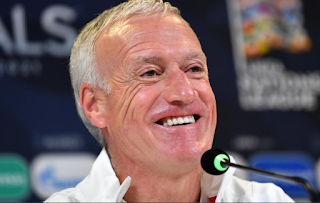The UEFA Nations League’s remarkable role in raising the competitive balance of national team football across Europe has made it an instant hit with coaches and fans - from the lowest- to the highest-ranked associations.
France or Spain, two of football’s most successful national teams, will add a first-ever UEFA Nations League title to their list of honours at the San Siro on Sunday, but the competition’s innovative structure means European football is already a winner.
Launched in 2018 to reduce the number of meaningless international friendlies and raise the competitive balance across national team football, the Nations League’s group stage is designed to make every game count by pitting teams of similar quality against each other. In Leagues B, C and D, teams of similar ranking compete to win promotion or escape relegation, while Europe’s top teams aspire to qualify for a final four tournament.
Speaking to UEFA.com ahead of the final, France coach Didier Deschamps and his Spanish counterpart Luis Enrique have been assessing the impact of European football's newest international competition.
Didier Deschamps, France coach
"When we come up against sides who are a bit weaker on paper, players are aware of that and it’s difficult to find the ‘adrenalin’, so to speak, to motivate yourself and be highly competitive.
"When you look at the groups, they’re the best national sides, since League A is made up of the best national teams in Europe. For us, topping the group after defeating Portugal away from home was what allowed us to qualify for this final four, and that was hugely satisfying.
"We want this trophy. In the past, there were two international titles, the EURO and the World Cup. There are now three with the Nations League, and we want to win it."
Luis Enrique, Spain coach
"This is a competition that we would love to win. If we’re able to put pressure on, as we usually put pressure on, if we are able to have the ball and find the spaces as I think we can find them, it will be a difficult match for them.
"We’re going to play against the world champions - of course, for us it would be very important to win. So, if we manage to win the match as we want, we will have a real chance of being world champions. If not, and the match becomes crazy, then it will be very complicated."
Third edition: all to play for
Whatever happens in Sunday's final, the winner will not have long to wait before planning their title defence. The 2022/23 edition’s league phase draw takes place in Montreux on 16 December with the first matches scheduled to kick off in June 2022 and the final tournament set for summer 2023.
Irrespective of ranking, every one of UEFA's 55 member national associations will have plenty to play for, as demonstrated by League C's Luxembourg.
After securing promotion from League D in the first edition of the Nations League in 2019, Luxembourg maintained their place in League C this time around with victories over Azerbaijan, Cyprus and Montenegro.
"All international matches help us to progress and are very important for us to evolve," explains Marc Diederich, press officer at the Luxembourg Football Federation (FLF). "Our hopes for the 2022/23 edition of the Nations League are to continue to perform well and to progress - our players are still very young, and we are not at the end of their evolution."
Amid a wave of positivity for football, the national association recently opened a new national stadium.
"The new stadium is wonderful and came at the right moment," Diederich adds. "If the pandemic situation would us allow to fill the stadium to 100 per cent, all matches would be sold out. We are happy to see that our team is progressing the last few years and that hard work pays off. We continue to work hard and try every match to progress."
Proof of concept: raising the competitive balance of European football
Luxembourg are far from the only team to have climbed the Nations League ladder. Here are a selection of other sides feeling the benefit.
Armenia
Armenia have earned two successive promotions in the UEFA Nations League. They started the first edition in League D and will start their 2022/23 campaign in League B.
Austria
Austria have lost only one of their last nine UEFA Nations League matches (W6 D1 L1) and have earned promotion to League A for 2022/23 courtesy of topping Group B1 in 2020/21.
Faroe Islands
Faroe Islands won just one of their six games in the 2018/19 edition of the tournament, but their performance in 2020/21 was much improved - they were unbeaten in six matches (W3 D3) and finished top of their section, which has earned them promotion to League C.
Georgia
Overall, Georgia have lost just one of their 12 UEFA Nations League matches (W6 D5 L1). They impressively topped group D1 with 16 points from a possible 18 in 2018/19 and have maintained their place in League C for the 2022-23 edition of the tournament.
Gibraltar
Gibraltar won a competitive game for the first time by beating Armenia in the Nations League in November 2018. In 2020/21, they remained unbeaten with two wins and two draws and clinched promotion to League C for the 2022/23 edition.
Hungary
Hungary will start the 2022/23 campaign in League A having earned two successive promotions. They finished first in group B3 in 2020/21.
Slovenia
Having finished bottom of their group in 2018/19, Slovenia enjoyed a much-improved 2020/21 campaign, topping Group C3 with four wins and two draws from six matches (and notably conceded just one goal in the six games). They are unbeaten in their last nine UEFA Nations League matches – no defeats since losing their first three games in the competition.
Wales
EURO 2016 semi-finalists Wales will compete in League A in the 2022/23 UEFA Nations League having impressively topped Group B4 in 2020/21 with 16 points from a possible 18 (W5 D1) – the most points gained by any team in League B. They kept five consecutive clean sheets in the campaign - the only goal they conceded was in a 3-1 victory against Finland in their final match.






0 Comments
please do not spam link